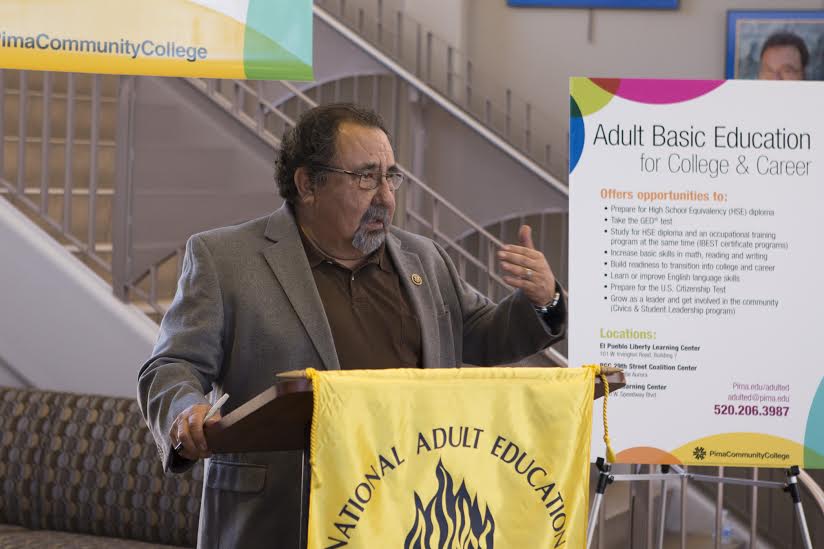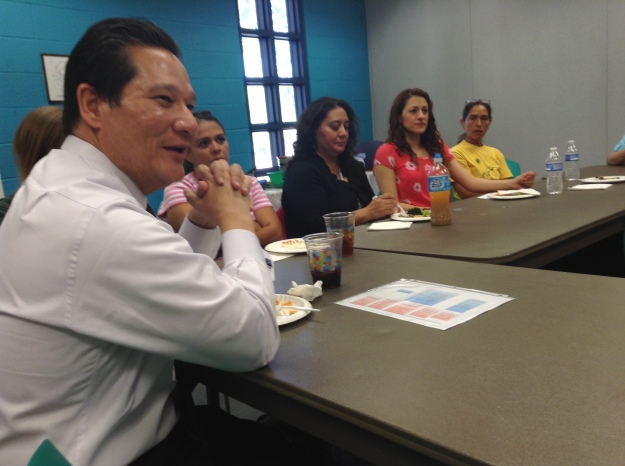

Instructor Katy Brown 
I recently had the privilege of attending the Early IBEST for Computer Science class at the El Rio Learning Center. Early IBEST is a Pima Community College innovation based on best practices learned while implementing the Integrated Basic Education and Skills Training (IBEST) model, which was developed in Washington State and which I instituted while President of Shoreline Community College.
In Early IBEST adult education students and English language learners work on their basic skills, while they explore careers in an occupation. In this Early IBEST, students are learning about the fast-growing field of Information Technology.
The Early IBEST students are studying Python, a computer programming language common throughout IT and other industries. They have written programs that convert Fahrenheit temperatures to Celsius and pounds to kilograms, as well as Mad Libs-type games. At the same time, they are improving their reading, writing, math and English language skills.
This successful initiative, like many at the College, depends on strong collaborations, both internal and external. The Microsoft Philanthropies Technology Education and Literacy in Schools (TEALS) program supplies the software and a trained industry volunteer to virtually teach the Python coding language. Our IT department has been instrumental in installing this distance learning system and keeping it up and running.
That sentiment is due to the dedication of Adult Education Staff Instructor Katy Brown. I should note that Katy is learning coding herself – pushing outside her comfort zone – to provide her students with the best-possible support. I thank Katy as well as Regina Suitt, Laurie Kierstead-Joseph, Laura Porfirio, Wendy Scheder Black and the ABECC team for their creativity and foresight in bringing this and other Early IBEST programs to underrepresented populations. Everyone can code, and this program is evidence of Pima’s commitment to prepare every student for success in our 21st century digital world.
This innovative model pays tangible dividends, with Early IBEST students attending 3 times more hours in a year and achieving educational gains at a percentage that is 20 points higher than traditional adult education students. One student told me that the coding class was the most important class taught at El Rio.
That sentiment is due to the dedication of Adult Education Staff Instructor Katy Brown. I should note that Katy is learning coding herself – pushing outside her comfort zone – to provide her students with the best-possible support. I thank Katy as well as Regina Suitt, Laurie Kierstead-Joseph, Laura Porfirio, Wendy Scheder Black and the ABECC team for their creativity and foresight in bringing this and other Early IBEST programs to underrepresented populations. Everyone can code, and this program is evidence of Pima’s commitment to prepare every student for success in our 21st century digital world.

 I was privileged to attend the beginning of a new era at the College recently. I was among about 50 students, educators and community leaders, including U.S. Rep. Raúl Grijalva, for the announcement that Pima Community College Adult Education has become Adult Basic Education for College and Career (ABECC).
I was privileged to attend the beginning of a new era at the College recently. I was among about 50 students, educators and community leaders, including U.S. Rep. Raúl Grijalva, for the announcement that Pima Community College Adult Education has become Adult Basic Education for College and Career (ABECC).

